How Much Salt Do You Really Need? (The Salt Fix, Part 3 Book Review)
How much salt do we really need?
In our part 3 book review of The Salt Fix, we’re finally getting the answers that we want. We already know by now that salt is crucial to all life forms, except now, we’re all wondering at this point, “How much salt do I really need?”.
Lucky for you, although I’m only covering one chapter this week, it’s quite a lengthy review that will unveil all the details on that very question.
Disclaimer: This book review is not intended to cure any type of illness, disease, or current health problems that you may be enduring. You should always consult with a trusted, medical professional before making any changes that involve your health.
In part 1 of The Salt Fix by Dr. James DiNicolantonio, we busted long-believed myths about salt and its relation to blood pressure, just how long our human race has been dependent on salt, and how salt somehow became the bad guy – but really it’s sugar we should be pointing a finger to.
In part 2 of The Salt Fix, we talked about what really causes heart disease, how people who look “healthy and slim” on the outside could actually be suffering from “internal starvation”, and how we can literally use salt to kick sugar addiction altogether.
Sound riveting? Sign up for our Hip2Keto Book Club now and continue reading with us!
🚨 SPOILERS AHEAD!!! 🚨
Now, I’m excited to get into Part 3 of The Salt Fix…
And the really good news for all of us healthy people is that we don’t even need to be worried about hitting salt overload because our bodies will take care of any excess. How amazing is that?!
“Scientific research suggests that the optimal range for sodium intake is 3 to 6 grams per day (about 1 1/3 to 2 2/3 teaspoons of salt) for healthy adults not the 2,300 milligrams of sodium (less than 1 teaspoon of salt) per day that’s commonly advised.”
Our bodies need more salt.
We’ve learned already that a low-salt diet can lead to many health problems (increased heart rate, harm to our organs, and so much more). In Chapter 7, Dr. DiNicolantonio really drove the point home and now we’re understanding that these insufficient “low-salt” diets we’ve grown accustomed to mixed with our modern health and lifestyle habits are putting us in much more danger now – more than ever.
*Note that if you have Hyperalfosteronism, Cushing’s Disease, or Liddle Syndrome, you should be concerned about consuming and retaining too much salt and should consult with your doctor.
There are risks of not getting enough salt:
- Increase in heart rate
- Dehydration
- Cognitive impairment
- Bone fractures
- Foodborne illness
- Impaired oxygen & nutrient flow to the tissues
- Even premature death
- It’s also harder for your body to activate fight or flight responses
- Can cause difficulty coping with physiologically stressful situations, gastrointestinal infections, blood loss, stroke, and heart attack
In addition to all of the potential risks of not getting enough salt, we also learned that there are a plethora of other fascinating reasons you may need more salt.
Here are 13 other reasons why you may need more salt…
1. To prevent dehydration.
Dehydration doesn’t just mean you’re sick, but it could be due to not getting enough water, you’ve upped your exercise regime, or you’re simply not eating enough salt. Make sure to add the appropriate level of salt to water liquids you’re drinking.
Hip Tip: To down salt more easily, Dr. DiNicolantonio, recommends diluting salt in a mixture of lemon, lime, and orange juice. You can check out our lemon water recipe similar to this!
2. To help manage shock.
Burns, trauma, or hemorrhage are all occurrences that our bodies could one day be susceptible to, but salt can help us withstand these unforeseen circumstances.
3. To counter low sodium levels.
Low sodium levels in the blood are called hyponatremia, and it’s the most comment electrolyte abnormality which can lead to many more complications such as the risk of falls, cardiovascular events, bone fractures, and so on, but can also be caused from other diseases such as HIV, liver cirrhosis, pneumonia, and more.
4. When you sweat.
When you sweat, you lose salt. In fact, if you consume more salt before and during exercise it will help your body cool off faster, improve blood circulation, better your overall performance, and reduce your risk of cramping and fatigue. You could easily lose more than an entire day’s worth of salt intake in just one hour of exercise!
If you’re not getting enough salt due to exercise, you could be putting yourself at risk for dehydration, tremors, muscular cramps and weakness, and even cardiac arrhythmias, joint pain, sleeping disorders, and many more things – all of which can be vastly improved by upping your sodium intake.
5. If you’re pregnant or lactating.
You simply need more iodine (which can come from many forms of salt or whole foods) when you’re pregnant or lactating. If you’ve even been pregnant or know someone who is, you might be asking yourself, “What about pregnant mom’s developing preeclampsia from eating too much salt?”
Well, that myth has also been busted when a study in The Lancet found that low-salt diet, compared to high-salt, actually caused more miscarriages, premature babies, stillbirths, perinatal and neonatal deaths, edema, preeclampsia, and bleeding.
6. For energy and muscle health.
Salt restriction can increase the likelihood of injuries during workouts, lead to weaker muscles and cause longer recovery periods, increase or worsen chronic fatigue syndrome, and decrease your muscle gain… certainly not something any gym enthusiast will desire.
7. When high-sugar diets lead to salt wasting.
If you read with us last month during our discussion about Grain Brain, you already learned that sugar is one of the worst things you could put into your body (the actual bad white crystal as we like to call it in The Salt Fix), but if you didn’t already know, it also depletes your body of the sodium it needs.
If you can kick your cravings and dependence on sugars and choose salt over sweets, you’ll actually start to crave them even less. Before you know it, foods that once tasted good to you will taste too sweet – which in hindsight, is how it should be!
8. For kidney disease.
Our kidneys are where all the magic happens – i.e. where salt is filtered out of our bodies. So, if you have kidneys that don’t function properly or you’re urine has more salt in it than what’s in the food you’re consuming than you likely have salt-wasting kidney disease.
9. If you have inflammatory bowel disease.
If you’ve ever heard the term “short bowel syndrome” this reduces a person’s ability to absorb salt, which in turn, requires additional salt intake. Besides moving just that, bowel movements, the primary job of the color is to absorb water and salt.
10. On low-carbohydrate diets.
If you’re reading this, you’re likely on a keto diet, Introducing more salt is crucial since you’ll have an increased level of ketones, a greater release of glucagon, and lower levels of insulin – all which increase excretion of sodium, even more so during the first 2 weeks of starting on a low-carb diet!
11. To prevent iodine deficiency.
If you’re following a low-salt diet, you’re twice as likely to not get the recommended daily amount of iodine. Luckily by eating whole foods you can cover your iodine daily needs by eating dairy, eggs, seafood, sushi, seaweed, cranberries, and potatoes that have been undercooked and cooled.
12. To fight infections.
Our skin literally needs salt to fight off and effectively get rid of pathogens. Our host-defense system is driven by salt. In addition to needing salt to battle off disease and infection, it is also crucial for helping with skin ulcers and can cause even more difficulty when warding off serious skin infections such as MRSA or even flesh-eating bacteria.
13. There are many other reasons to need salt, too.
- If you have chronic diseases, such as hypothyroidism, adrenal insufficiency, congestive heart failure.
- If you’re taking commonly prescribed medications, like diuretics, antidepressants antipsychotics, & some diabetes drugs.
- If you have a dependence on caffeinated beverages.
- If you have Autism, a disorder of overhydration which causes low sodium levels in the blood.
- If you consume nicotine in any form, as smoking cigarettes, cigars, pipe, and chewing tobacco have an increased risk of low blood sodium levels.
- If you experience hypotonic hyponatremia, frequent in schizophrenic patients or people who overconsume beer whereby the increased bicarbonate in the urine forces sodium to flow out of the kidneys.
In summary, we all need salt, but at what point do we actually need more than what we’re being told is healthy? More than likely, we all fall under one (or more) of these categories on more than one occasion.. .if not on a daily basis.
“Because of the many chronic disease states and medications that cause salt depletion in the Western world, we are now at a much greater risk of salt deficit then even primitive societies that eat very little salt.
Thankfully, now that we recognize this, we can do something about it – and, in doing so, we can help ourselves prevent or even reverse many of today’s most debilitating conditions.”
“Salt is a powerful ally in our fight for a clean, healthful food supply. Remember: you could live the rest of your life without eating another granule of sugar, but you can’t stay alive for very long without salt.”
Ready to learn more about The Salt Fix and how to adapt (and eat) with this new lifestyle? Let’s go!
Week 4
Part 4: The Salt Fix: Give Your Body What It Really Needs – Chapter 8 (pgs. 159-188)
Look forward to an outlined, step-by-step program and consuming the salts you really need.
Do you still need a copy of The Salt Fix book to read along with us?
Grab The Salt Fix hardcover, Kindle version, or audible version of the book to read along with us!

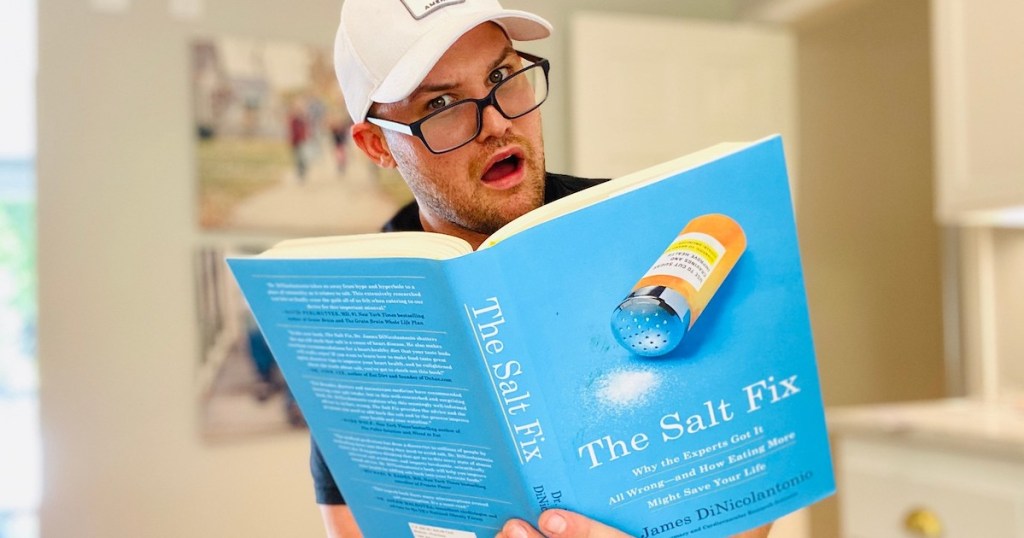
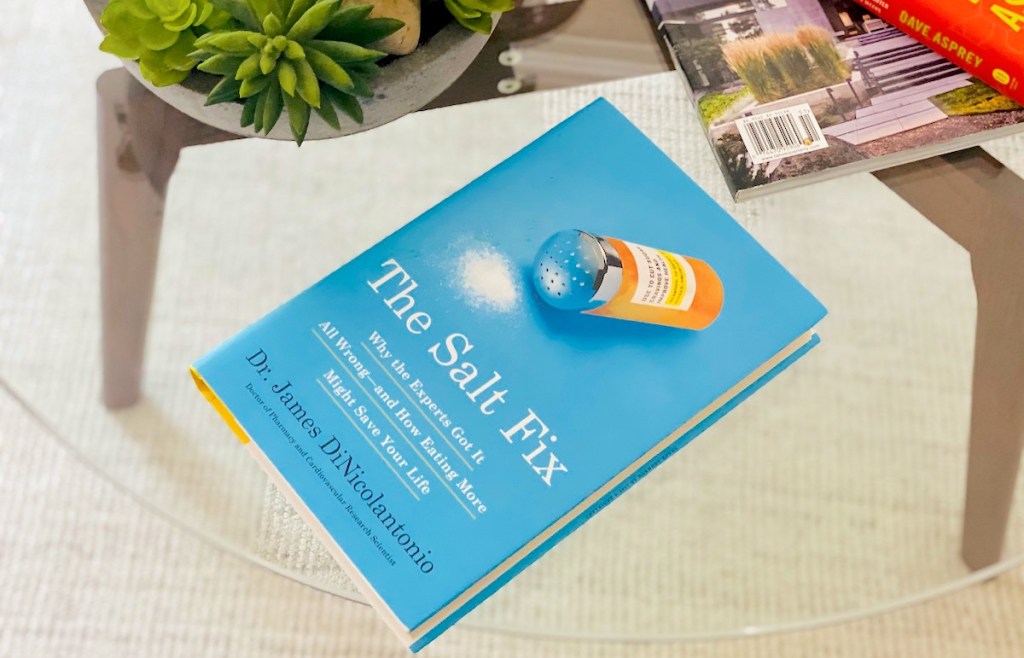
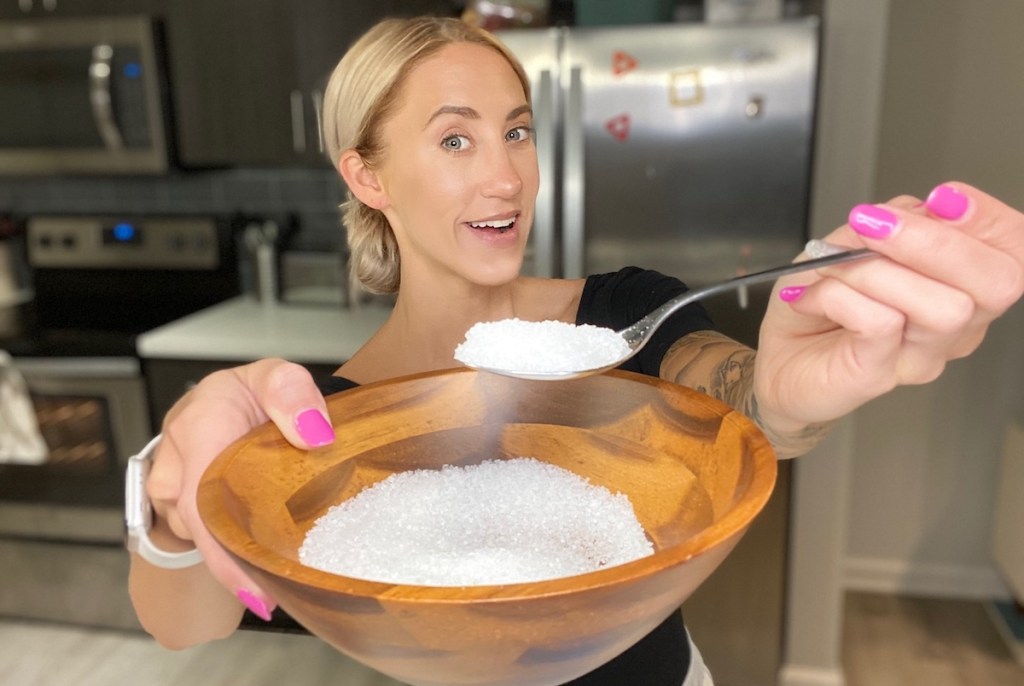
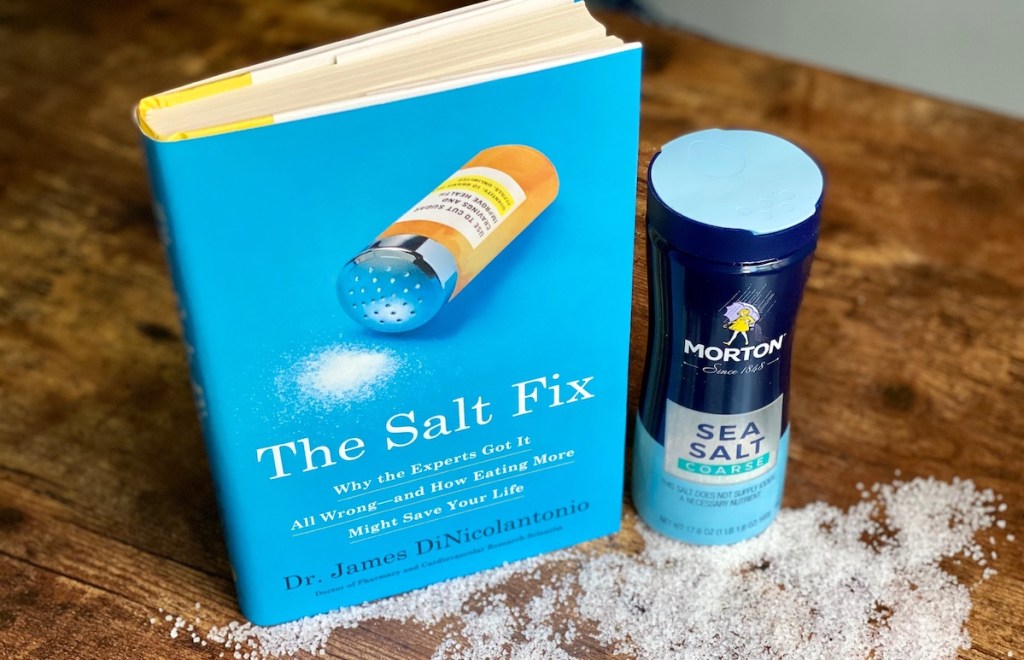

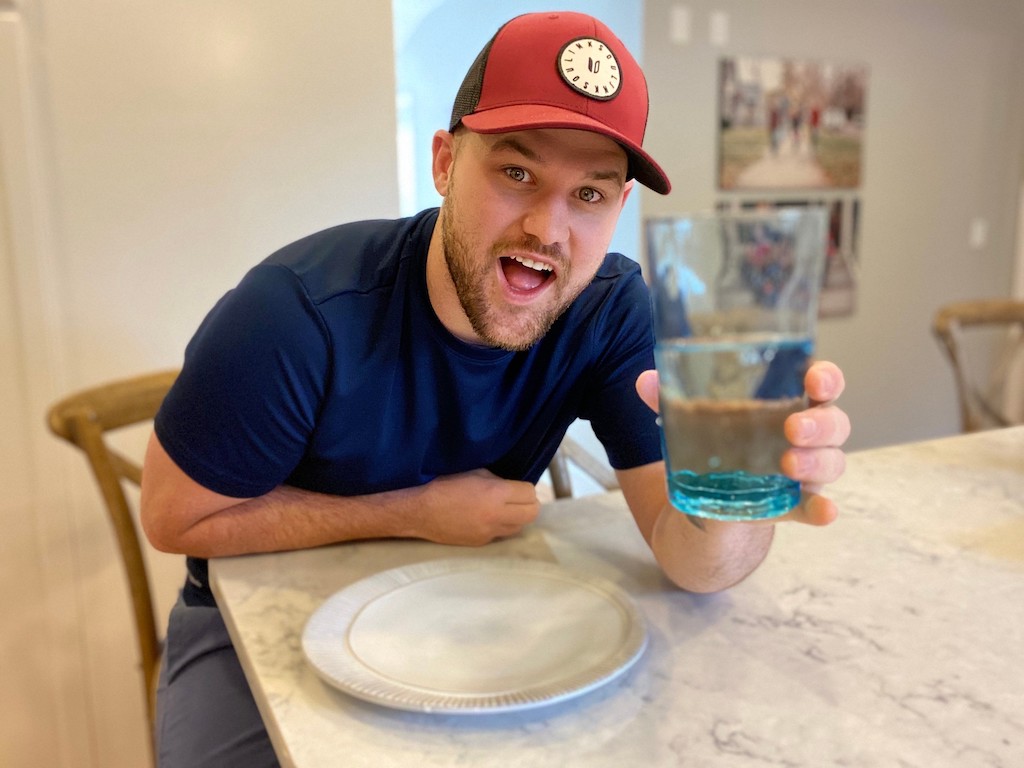


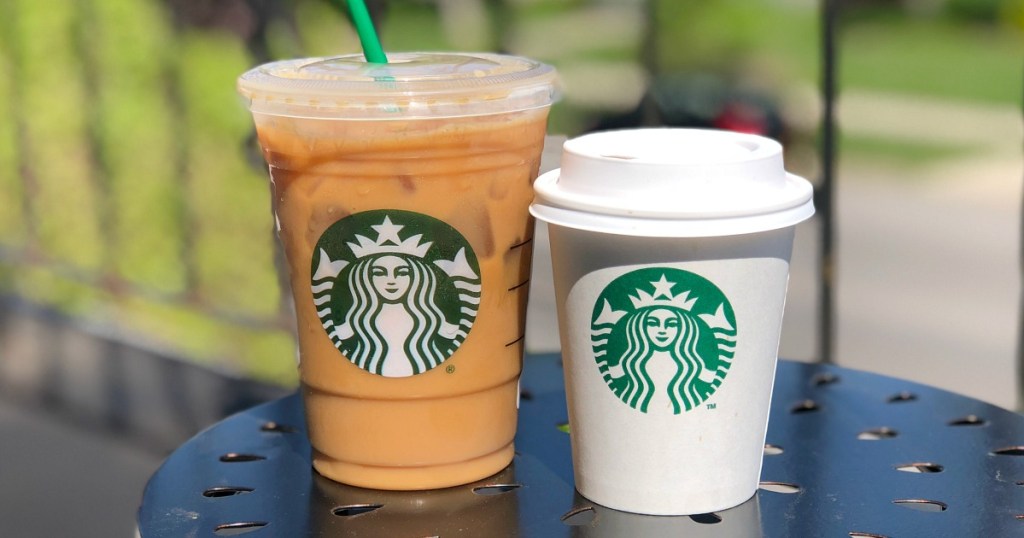
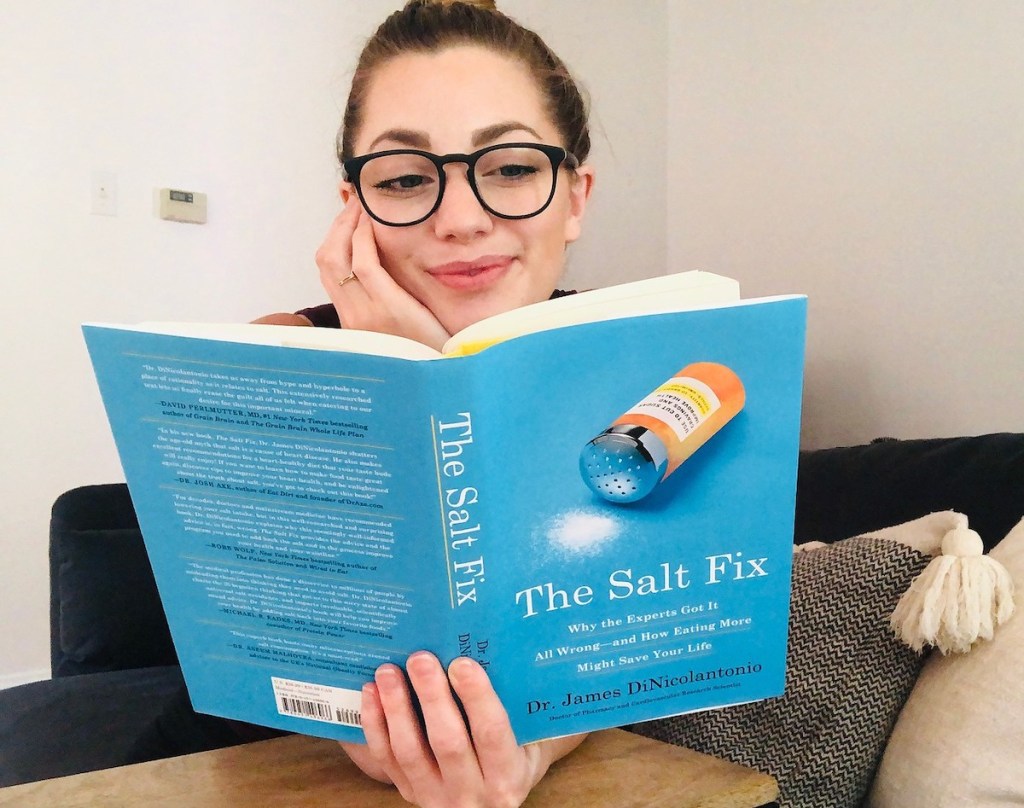
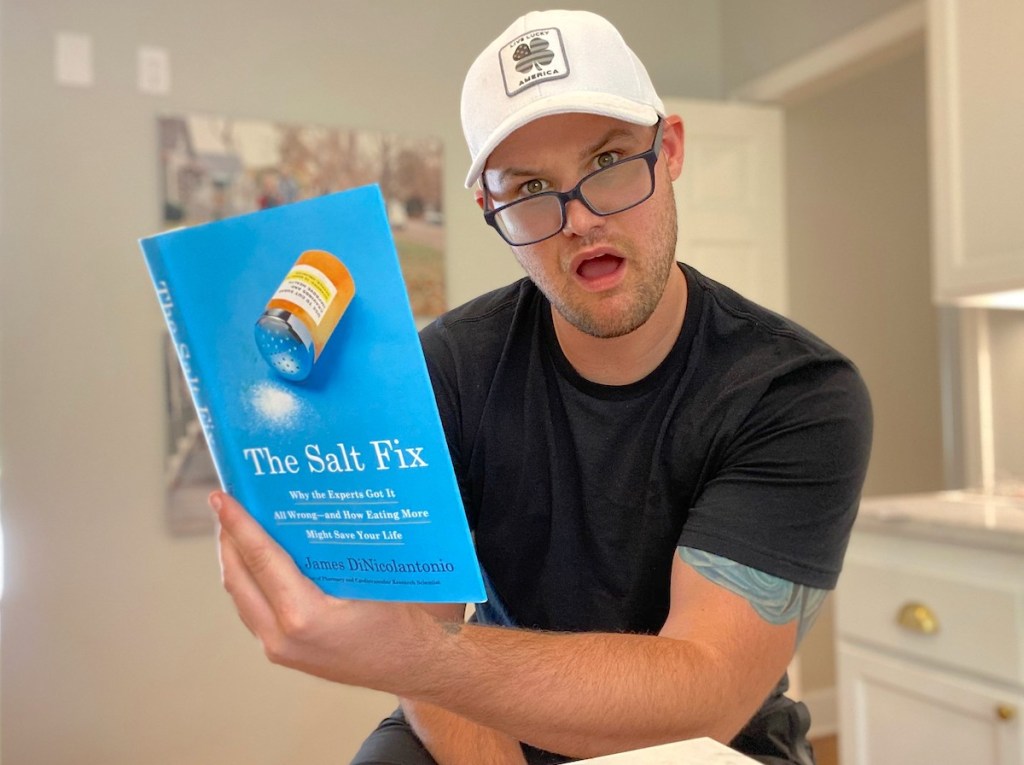
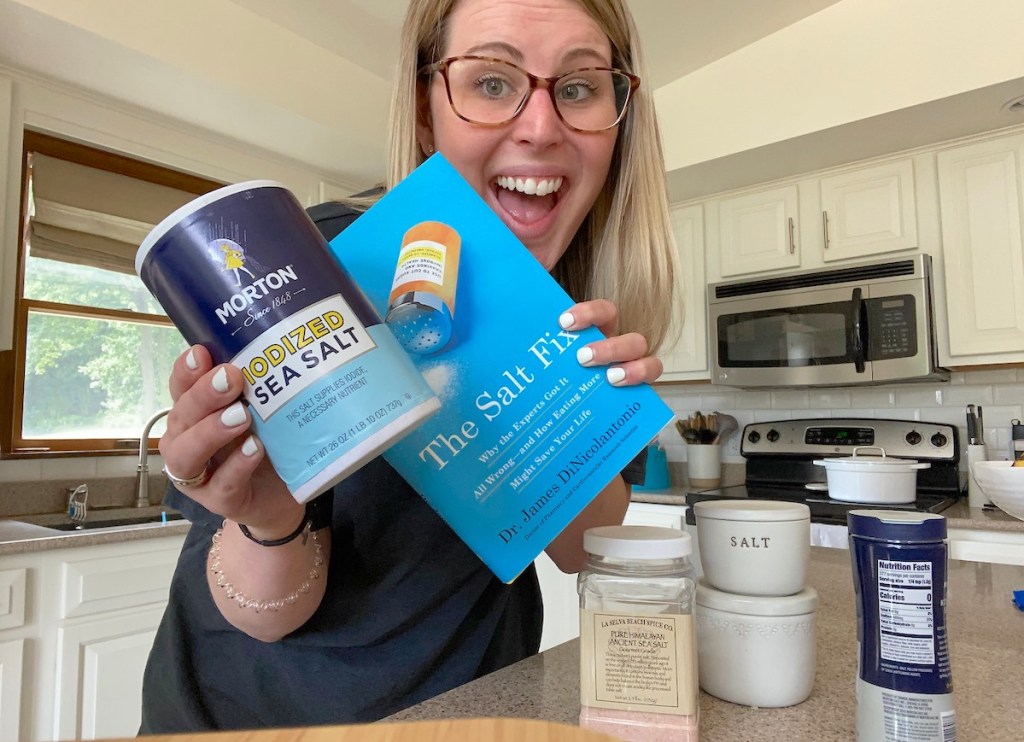


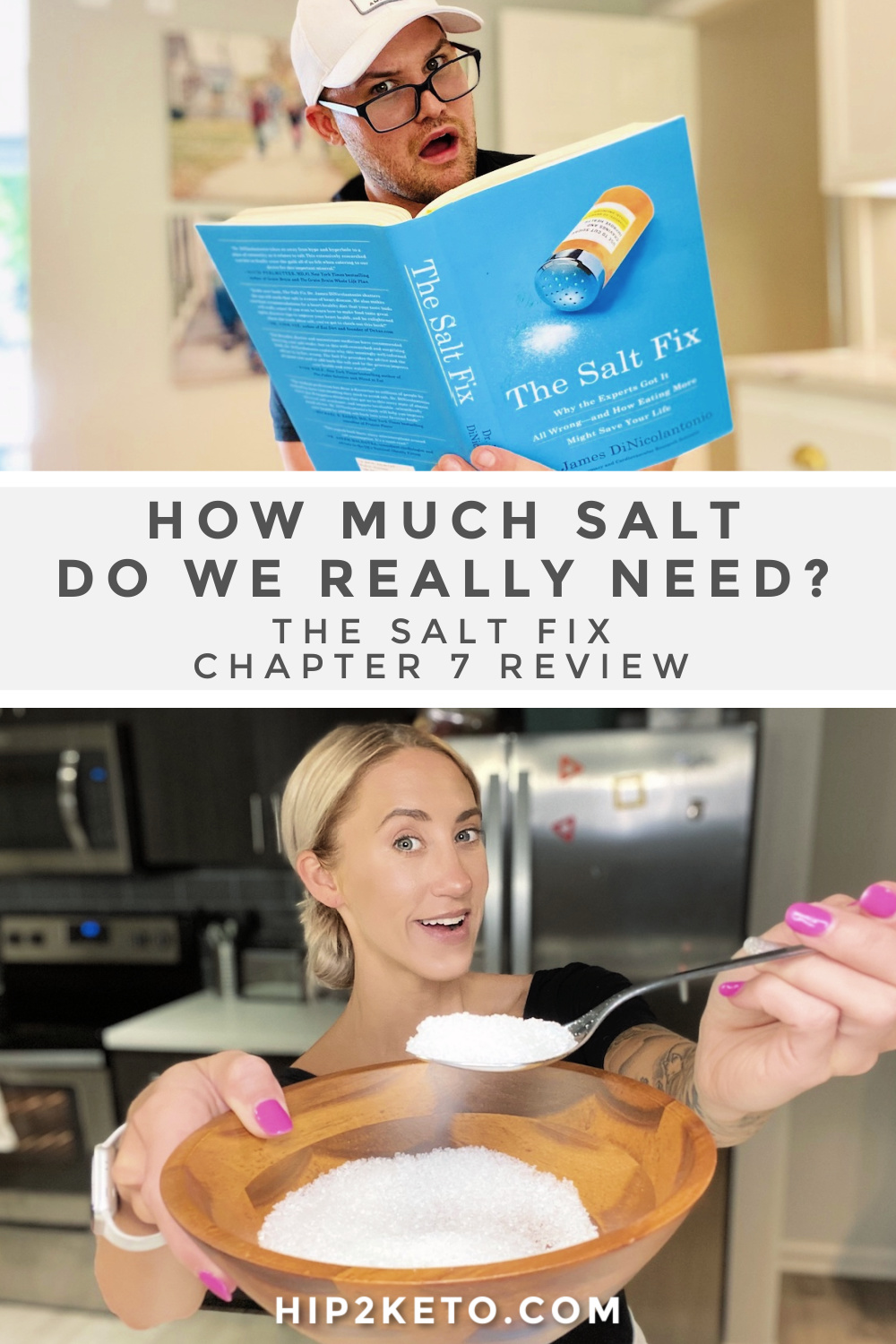
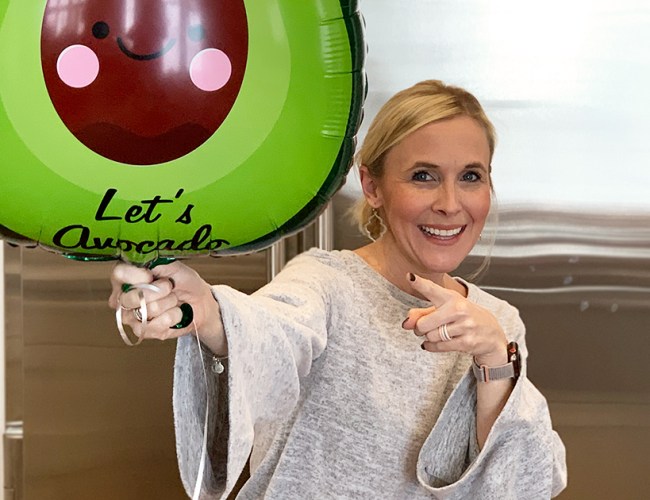
Thanks for the synopsis! I’m a little behind in my book, but looking forward to catching up next week.
You are welcome!
You’re so welcome, Julie! Keep us posted!
Why do I get insane edema in my face after having salt even on a low carb diet? I have high cortisol at night so does this mean I need less salt?
Everyone has different sodium needs. As a general rule, if you retain fluid after a high salt meal, you probably had too much. Usually people swell in their extremities, hands and feet. Face swelling could be related to high cortisol but best to talk to your doctor.
Salt is necessary for life, no doubt there… But are the following *truly* the risks we face if we don’t consuming a higher-salt diet as recommended by James DiNicolantonio in The Salt Fix?
Increase in heart rate
Dehydration
Cognitive impairment
Bone fractures
Foodborne illness
Impaired oxygen & nutrient flow to the tissues
Even premature death
It’s also harder for your body to activate fight or flight responses
Can cause difficulty coping with physiologically stressful situations, gastrointestinal infections, blood loss, stroke, and heart attack
I’ve thoroughly fact-checked over 50 of the claims in The Salt Fix here: https://rebelthoughts.org/fact-checking-the-salt-fix (no ads, no affiliate links)
Spoiler: many of James DiNicolantonio’s salt-related claims get torn to shreds. Enjoy! 😜